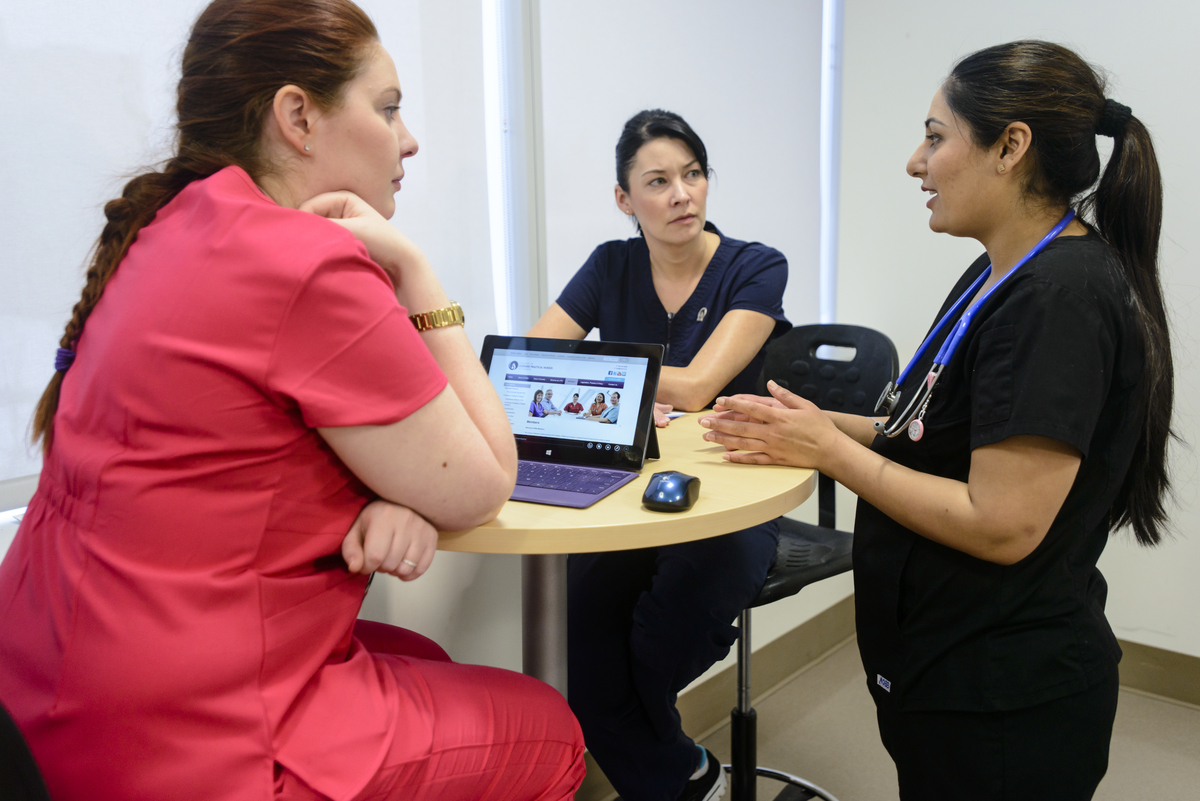Nursing is hard work but the people who choose this profession aren’t in it for fame or fortune. They are in it to help others.

“Nursing is not only a science, but it is the art of caring,” said Donna-Lee Wowk, a licensed practical nurse (LPN) in Lac La Biche, a small community about 220 kilometres northeast of Edmonton. “We have to be academically strong, but we also have to have a strong interest in human nature and have an air of kindness. I can’t speak for the whole LPN profession, but that’s how I feel.”
For many people, nursing is a calling. Often, it’s a profession that has been followed by someone in a family for generations. In Wowk’s case, her career choice was more of an accident.
“Some people say they always wanted to be a nurse. I kind of stumbled into it,” said Wowk, who has been practising as an LPN for 14 years and now instructs the next generation of licensed practical nurses at her alma mater, Portage College in Lac La Biche. “My son at the time was about a year and a half and I realized that being a full-time, stay-at-home mom wasn’t what I wanted to do for the rest of my life so I thought I’d go back to school.”
Wowk took the two-year college program for LPNs which is taught at community colleges across the province that gives future nurses a solid academic background, but also the knowledge necessary to give excellent front-line care. Wowk fell in love with her new profession. She began working in acute care at the local hospital the Friday she graduated and has worked a variety of positions in the local health-care network ever since.
“What I like about working on acute care is the variety of things that you get to see and the human contact that you have and making those connections with clients and providing exceptional care for them,” said Wowk, who added that the role of the LPN has changed over time, with greater responsibilities being added as it evolves which she finds exciting.
“As the profession has changed over the years, the academic requirements have certainly changed, particularly over the last 15 years,” explained Teresa Bateman, director of practice and communications at the College of Licensed Practical Nurses of Alberta. “We’ve had the opportunity to work with employers to identify some of the gaps within the health-care system and examine how our profession can step up.” She adds, “We’ve been able to build multi-skilled, dynamic nurses that can fit into some of these unique roles or even additional areas where the staffing requirements need more nursing services.”
Alberta’s Health Profession Act recognizes three professional nursing designations — registered nurse, which requires a four-year degree, registered psychiatric nurse which is a three-year diploma program and the LPN.
“One of the things I think is unique about this profession is that LPNs hold competencies that make us exceptional bedside nurses,” said Bateman.
“All nurses take the same fundamental components of nursing theories, anatomy and physiology, health assessments, critical thinking, holistic care and wellness, but the focus for LPNs is nursing care at the front line.”
“This patient-care focused component of their role makes the LPN an invaluable team member enriching opportunities in practice,” she said. “It doesn’t mean that they don’t get some components of leadership and administration within their education, but the focus is on clinical bedside nursing.”
Nursing has long been considered to be “women’s work,” but Bateman says that more and more men are entering the profession, adding that about eight per cent of the province’s more-than-15,000 LPNs are male.
“As the role has changed and evolved, I think more men have seen opportunity. Nursing is not just for women. There are all kinds of opportunities in clinical practice that are interesting for both men and women, such as highly technical skills and high acuity areas, or interesting community-based roles like in corrections or leadership,” said Bateman.
Wowk says she teaches students of all ages who come through her classes and wants to pass on her love of the profession to them and encourage their desire to help others. “I want to instill that passion for lifelong learning and delivering high-standard care,” she said.
“Once someone becomes a nurse, it’s something they carry with them their entire life. It’s like it’s part of their DNA.”
As an LPN herself, Bateman added “People really have to be drawn to the profession by a true desire to make a difference for people.”
The LPN’s roots are as nursing assistants during the Second World War, but their role has been constantly changing with the times, and Bateman believes that even more changes lie ahead for the profession, bringing new challenges as well as opportunities.
“We’re at a time when future innovations in health care are going to demand that nurses and other health professionals are very adaptable, dynamic and responsive to what the needs are,” she said. “As technology changes, as new innovations come into care environments, as things like artificial intelligence impact the future of healthcare and the future of our world, there will be many changes, with new opportunity for open-minded nurses.”

